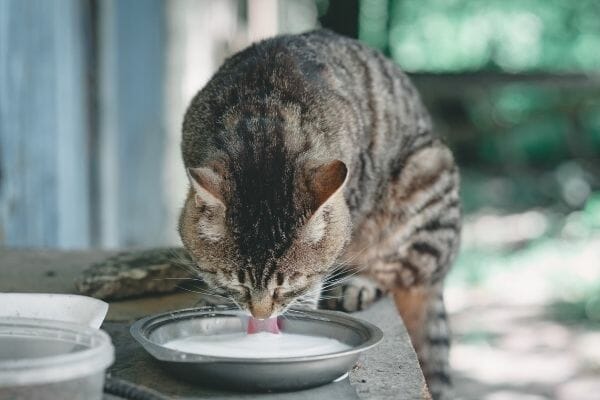Cats and milk go hand in hand… or at least that’s what popular media would like people to believe. Animal experts have revealed that most adult cats are actually lactose intolerant, meaning they are unable to fully digest the sugar (lactose) found in milk.
So does this mean cats can’t drink milk at all? This Waldo’s Friends article discusses:
Can kittens drink milk?
Kittens have the capacity to digest their mother’s milk or kitten glop. Kitten glop is a specially formulated cat milk substitute or kitten supplement formula. It is usually given to kittens who are orphaned, or those who refuse to nurse. But more than just kittens, other cats can also benefit from drinking kitten glop. Senior cats who have a difficult time eating solids, convalescing cats, and nursing cats are just a few examples.
Note that not just any type of milk can be given to kittens. Cow’s milk contains too much lactose, and the casein to whey proportions found in it are not appropriate for them. Feeding a kitten cow’s milk may lead to diarrhea and dehydration. Though other types of milk may not have lactose, they do not provide the necessary amino acids kittens need to flourish.
As kittens grow older, their bodies begin to produce less lactase, making it more difficult for them to digest milk.

What happens when cats drink milk?
When an adult cat drinks milk, she will most likely vomit, have diarrhea, or experience an upset stomach within 8 to 12 hours of consumption. This is caused by the undigested lactose that passes through the intestinal tract. As it goes through her digestive system, it draws water with it. The bacteria found in the colon also ferment the undigested sugars and produce fatty acids.
What kind of milk can cats have?
A tablespoon of milk might not upset your cat’s stomach, but this doesn’t mean you should feed her milk regularly. This is because cats are obligate carnivores that don’t need milk in their diet. Milk is considered a treat, which should only make up 5 to 10% of her daily dietary requirements.

Here’s a list of the different types of milk, and whether or not it should be fed to your cat. Remember that there are risks that come with feeding her milk, and that not all kinds should be given to her:
- Almond milk – Yes, but only occasionally and in limited quantities
- Cashew milk – No, because it is high in fat
- Coconut milk – Yes, but only occasionally and in small amounts since it contains a high levels of fat
- Condensed milk – No, because it is high in sugar
- Cow milk – No, since your cat will not be able to digest the lactose found in it
- Evaporated milk – No, since it contains sugar, which will not benefit your cat
- Goat milk – Yes, but only if your cat can tolerate it and it is given in limited quantities
- Rice milk – No, because it is high in sugar
- Soy milk – No, since it contains hormones and chemicals that may produce unwanted side effects
In conclusion
If you really want to feed your cat some milk, get your veterinarian’s approval before doing so. The safest type of milk to give your cat would be properly formulated milk replacement products. These will provide the essential nutrients your cat needs.
Is your cat experiencing other digestive issues? Learn how to syringe feed a cat, find out what to give a cat with a sensitive stomach, and discover 5 possible reasons why your cat vomits after eating.
Leave a comment
Your email address will not be published. All fields are required.